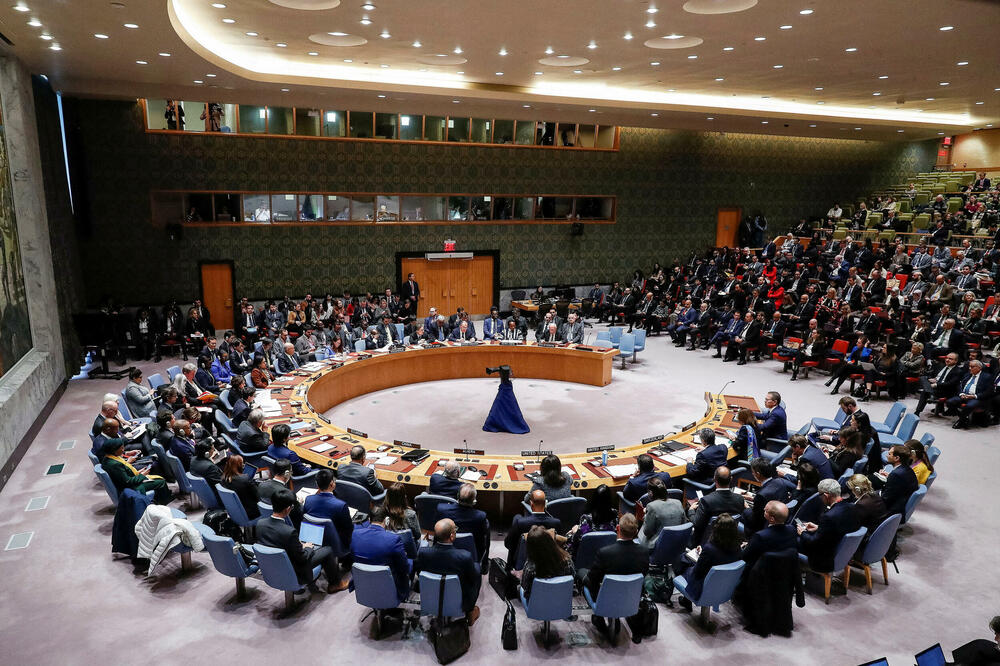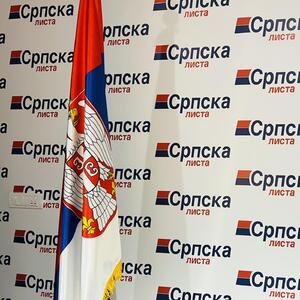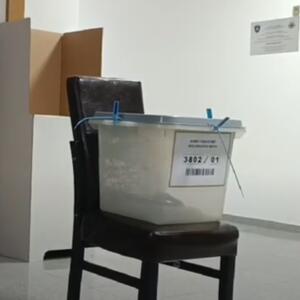The President of Kosovo, Vjosa Osmani, rejected today at the United Nations Security Council (UNSC) session on Kosovo as false and unfounded the claims of the President of Serbia, Aleksandar Vučić, about the ethnic cleansing of Serbs from Kosovo.
"These narratives have been discredited from the Helsinki Committee to the European Parliament. The state of Kosovo not only protects, but also promotes the rights of Serbs and all other communities," said Osmani.
According to her, Kosovo has an advanced level of rule of law and protection of communities and "will fanatically defend multi-ethnicity".
She added that Kosovo is among the most pro-European and pro-American countries in the world and that it was among the first to support Ukraine.
Osmani said that Kosovo Serbs are represented in all social spheres.
"The Serbian language is used in all public institutions throughout Kosovo. Orthodox churches have special protection from the state of Kosovo. Apart from some isolated incidents, there is no ethnic motive against Orthodox churches," she stated.
She accused Serbia of harassing Serbs who integrate into the institutions of Kosovo by attacking their property, destroying and endangering their lives.
"Now it is clear that Serbia's continuous efforts to hinder the integration process of Serbs in Kosovo, using criminal and terrorist tactics, are aimed at gaining control and spreading fear, and in this way they simultaneously undermined the security and constitutional order of Kosovo," Osmani said. .
According to her, the Serbian government is responsible for the attack in the Zvečan village of Banjska, because "the perpetrators of the attack move freely around Serbia and continue to receive large business contracts from the Vučić government."
Speaking about yesterday's voting process for the impeachment of the mayor in the municipalities in the north of Kosovo, Osmani said that the local Serbs were under pressure and therefore did not take advantage of the opportunity to vote.
"Pristina creates unbearable conditions for the life of Serbs and other non-Albanians"
Vučić stated that the Pristina authorities create unbearable conditions for the life of Serbs and other non-Albanians, assessing that the pogrom of Serbs in Kosovo has been going on since 1999 until today.
At the session of the UN Security Council, where the new, six-month report of the UN Secretary-General Antonio Guterres on the work of the UN Mission in Kosovo (UNMIK) is being considered, Vučić said today that the "brutal repression" against Serbs and non-Albanians has intensified after the emergency session of the UN Security Council on Kosovo , held on February 8 at the request of Belgrade.
Vučić said that at that session of the UN Security Council, Serbia "explained in detail how the temporary institutions in Pristina continuously and deliberately create unbearable conditions for the life of Serbs and non-Albanians".
"Serbia presented to the UN Security Council all the steps by which Pristina carried out planned, widespread and systematic attacks on Serbian civilians, including continuous legal violence, physical violence and targeting," said Vučić.
As specific moves by which Pristina creates unbearable conditions for the life of Serbs, Vučić mentioned the illegal expropriation of land, preventing freedom of movement for Serbs with "meaningless stops and humiliations", arbitrary arrests of dozens of prominent Serbs, long detentions for those arrested and the almost constant presence of armored vehicles in urban areas. .
Vučić also said that Serbia demands the immediate release of "all political prisoners held by the Pristina regime", stating that without this "there can be no reconciliation".
Vučić started today's 45-minute presentation by pointing out that last Sunday was the 11th anniversary of the signing of the Brussels Agreement, stating that one of the signatories was the European Union. He said that the Serbs fulfilled everything they committed to in that agreement, and that Pristina did not form the Union of Serbian Municipalities (USO).
"It has been 11 years since the signing of the Brussels Agreement, the most important agreement on the road to normalization. Those 11 years of unfulfilled promises, everyday excuses and untruths, as well as the accidental or deliberate inability of the European Union to move things from the deadlock, have resulted in continuous legal violence and physical mistreatment of Serbs in Kosovo and Metohija," said Vučić.
Vučić said that Guterres' report on the work of UNMIK from September 19, 2023 to March 15, 2024 "does not indicate the seriousness of the situation on the ground, although it factually documents almost all significant events in that period." He added that the document also "misses the connection of events".
The President of Serbia also said that with the recent ban on the use of the dinar in Kosovo, Pristina "made the daily life of Serbs and other non-Albanians, who mostly receive their income in dinars, even more difficult."
"The cancellation of the dinar represents the culmination of an ethnically motivated campaign by the Pristina institutions against the Serbs. Although (Kosovo Prime Minister) Aljbin Kurti told you (on February 8) that he had given the Serbs a three-month transition period, no one in Pristina or in the international community mentioned this anymore, and the application of that measure against the Serbs began immediately," said Vučić.
He stated that Serbs and other non-Albanians in Kosovo still cannot receive pensions, salaries, child allowance and social benefits in dinars and added that because of this, the work of schools, kindergartens, health and social institutions is "practically impossible".
"Employees in those institutions who are still working daily face the fear of unfounded arrests carried out by Kurti's regime en masse under false charges. This situation greatly affects children in kindergartens, pensioners, single mothers, the seriously ill, as well as on everyone else," said Vučić.
He said that since the session of the UN Security Council on Kosovo on February 8, there have been 16 ethnically motivated attacks on Serbs.
"This includes an armed attack on Serbs in Gračanica, intimidation of the decreasing number of Serb returnees in the west of Kosovo and Metohija, unjustified detention, police removal of signs with names in Serbian in purely Serbian municipalities in the north of Kosovo and Metohija," stated Vučić.
Regarding the conflict between an armed group of Serbs and Kosovo police in the village of Banjska on September 24, Vučić said that Belgrade "unequivocally condemned" the violence, but that these events "were not the cause, but the consequence of the repression of Aljbin Kurti and the persecution of civilians."
"And that's why we will not allow that tragedy to be used as an alibi for the persecution of Serbs, nor to divert attention from it," added Vučić.
Vučić expressed his protest over the fact that behind Kosovo President Vjosa Osmani-Sadriu sat women who were reported to have witnessed the crimes of the Serbian army and police in the 1990s.
Addressing the chairman Vanessa Fraser, representative of Malta, Vučić said that Serbia should have been informed "that some citizens who will be present at the session (Osmani-Sadriu and her team) will bring more people to blame the other side".
"Something like this happened for the first time in the UN Security Council. You brought people who do not belong here, neither to the diplomatic corps, nor to Mrs. Osmani's advisory team. It is a kind of political theater and a set-up for the Serbian delegation," Vučić said at the session where it was discussed the new report of UN Secretary General Antonio Guterres on the work of the UN Mission in Kosovo (UNMIK).
Chairwoman Fraser replied to Vučić that the UN Security Council "has nothing to do with it", but that the people from the UN protocol who give accreditations are responsible for it.
The presence of women sitting behind Osmani-Sadriu was also criticized by the Russian ambassador to the UN, Vasilij Nebenzja, claiming that they had no right to be there, while the Kosovo president stated that they were members of her cabinet and her advisers.
Reacting to the presence of women who were said to have witnessed the crimes of the Serbian army and police, Vučić asked if anyone thought that no Serb women were raped during the war in Kosovo.
"There is a person I could not bring as part of my delegation. That is Marica Mirić from Bijelo Polje, from Kosovo, who was raped several times during that period, and then killed. But that is not the topic of our meeting today," said Vučić.
Vučić also criticized Osmani-Sadria for the content of her presentation, saying that her speech acted like a "trial for war crimes against Serbs for something that happened 25 years ago."
"We haven't heard a single word about the report (by Guterres) or about the events (in Kosovo) in the last six months. On the other hand, I was completely focused on the report presented by (UNMIK chief) Karolin Zijade," said Vučić.
Bonus video:






